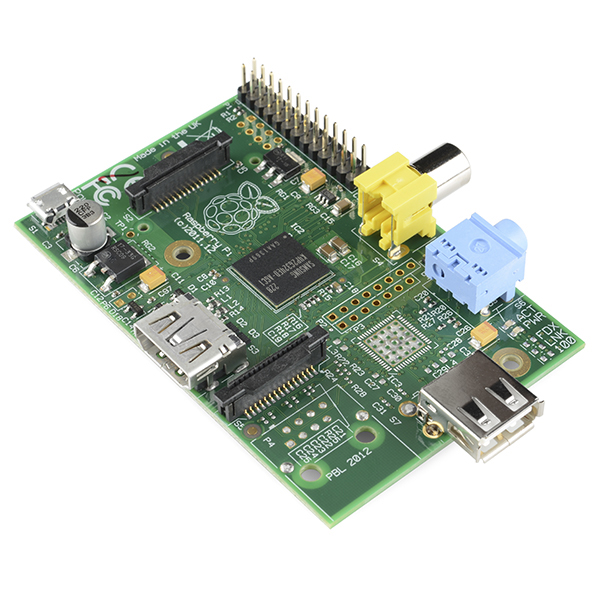Getting kids coding: Raspberry pi
Interview with
Computers, mobiles phones, even calculators - none of these would be possible without coding. But what actually is coding, and is it really a problem that  so few of us know how to do it? According to industry figures, over the next 5 years the UK faces a skills shortage of 1.4 million digital professionals; in other words, people trained in computer programming. Someone who is trying to change this Eben Upton, CEO and founder of the Raspberry Pi Foundation, and he explained to Chris Smith how they are planning on doing this...
so few of us know how to do it? According to industry figures, over the next 5 years the UK faces a skills shortage of 1.4 million digital professionals; in other words, people trained in computer programming. Someone who is trying to change this Eben Upton, CEO and founder of the Raspberry Pi Foundation, and he explained to Chris Smith how they are planning on doing this...
Eben - We're trying to get a new generation of children interested in programming computers in the same way we were in the 1980s. Between the mid-1990s and about 2005, we saw a collapse in the number of people applying to study computer science in the university here in Cambridge. It's really been mirrored across the entire university sector in the UK. So big threat to, I guess the future, our future economic competitiveness in the UK.
Chris - Why did you see that collapse?
Eben - We have a hypothesis and that's the disappearance of machines like the BBC microcomputer, the Sinclair spectrum in the 1980s. As those machines disappear, they were replaced by games consoles and the PC machines which are either less programmable or just don't encourage you to programme in the same way. About 10 years after those machines went away, the flow of young people who've been trained on them started to dry up.
Chris - Indeed because we saw this big bubble of people who were born with the BBC coming along. I was one of them. I remember coming to Cambridge to buy my BBC model B plus microcomputer here in Cambridge in 1984. I was a bit of a later comer to the game I understand because it had been out a little while by then. But this really was a game changer because it brought within reach of your average home user the power of a modern computer.
Eben - Yeah, so it provided a computer that sure you could use it to do your school work on, you could use it to play computer games on, and that's why many people bought them. But the thing they all had in common is you turn them on, they go beep and they give you programming problem. The very first thing you could do with all those machines is to start coding.
Chris - What motivated you to actually start Raspberry Pi and to do it the way you've done it?
Eben - I think there's something about a piece of hardware as opposed to just a software platform. A lot of people very early on with Raspberry Pi said, "Why don't you just create an application you could run on a PC?" The nice thing about a piece of hardware, particularly a piece of hardware that a child owns is they can become very, very attached to it. I think the signs are very promising. There has been a massive upswing in interest but yeah, I think it's probably going to be another 5 or 6 years before we really know for sure whether our hypothesis is correct.
Chris - Because you're going to see this sort of lag effect now to see if you've captured this next generation of people and then turn them into computer programmers. I think it's amazing. I mean, let's just describe for people what a Raspberry Pi is. What is it?
Eben - It's a little credit card-sized computer. It's a little credit card-sized circuit board. By default, it doesn't even come with a case but you plug it into your television. You plug a mouse and a keyboard into it and it's a PC. You can use it to watch a video, you can use it to surf the web - a full featured machine. But what we do is we bundle it with every programming language that we think you need to go from knowing nothing about computers to being a professional computer programmer.
Chris - I have to be honest because out of intrigue, having had you on our programme, I went and got one.
Eben - Thank you.
Chris - But it's 23 quid. I mean, that was part of the motivation. Who could ever dream of owning a computer that would cost you 23 quid? I mean, it's incredible value for money really.
Eben - What you're talking about there is our expensive, that's our deluxe model. We actually have a 16-pound model as well. So, it's really about trying to bring it within that - for us, kind of the benchmark here is a school textbook. We know that you can ask children to buy their textbooks at school. Most families can afford it. The families who can't afford it, you can afford to subsidise it. So, it's really getting it into that kind of envelope which is really the driving force behind the design of the hardware.
Chris - I know it works though Eben because having bought one myself, I then felt compelled to do something with it and I immediately, within 6 months, learned two new programming languages. So, there's the evidence. For me, it works but then yesterday, I watched my daughter who I've been encouraging to do this, SSH into using a terminal window into a Raspberry Pi on a Wi-Fi network at home and then actually begin to modify a programme that I'd written and she actually had this little array of things and she could make it print an animal's name as many times as she chose and that kind of thing. I think this is fantastic. You've got someone who's 8 actually speaking computer languages.
Eben - Yeah. There's something wonderful about it. It's something wonderful about the enthusiasm for it. There is always that kind of the other hypothesis, the kind of gloomy hypothesis was that young people, that they aren't interested. They have their tablets and their phones and their games consoles which are very shiny, and exciting, come in a nice box and that that might have killed off the interest. What we actually discovered with the Pi, vast number of kids. If you can get them over that first 5 or 10 minutes, just give them an intro to it then they're away. It gives them a kind of secret knowledge often that the adults - kids love having secret knowledge. When I was a kid, it was being the person who could set the time on the video recorder. Kids love that stuff and coding is a really fertile source of secret knowledge for kids.
Chris - I feel very uneasy that what's been defined as computing has ended up being, "Can I use Microsoft word and excel" and that kind of stuff. The real bare bones of actually, "Can I write computer programmes" has largely been overlooked and lost.
Eben - Yeah. I think we had 10 or 15 years of really, teaching people the wrong stuff. The former unlamented ICT curriculum in the UK was teaching children both things that they didn't find interesting. It was teaching them several times. We meet a child who have been taught how to use PowerPoint every year between the ages of 6 and 18, right? We'd somehow managed to turn computing which could be about writing games and building robots. We turned computing into what was regularly rated as the most boring subject at school. And so, you're teaching these people things. You're boring them out of their minds and the skills you're teaching them are not the high value skills. They're not the skills that will enable them to go and get a high value job. You're basically teaching the outsourceable, offshoreable skills of typing.
Chris - How much will a person who goes into the computer industry earn in a year now? It's quite high, isn't it?
Eben - Yeah. It's one of the best paying professions. If you choose to go into engineering - we're not saying that everyone should. I've been an engineer on my adult life. My view is, I've been paid for 20 years now to play with toys, to basically play with Lego every day. So, some people go into that which I'll find very rewarding. And some people will find that the skills that they've learned by doing computer programming, we think coding makes you a better lawyer. It makes you a better doctor. Maybe it doesn't make you a better novelist but pretty much everything that you might just like to go into as an adult, you'll benefit from that kind of mind set.
- Previous Sonic Pi: code that funky music!
- Next Designing better body armour









Comments
Add a comment